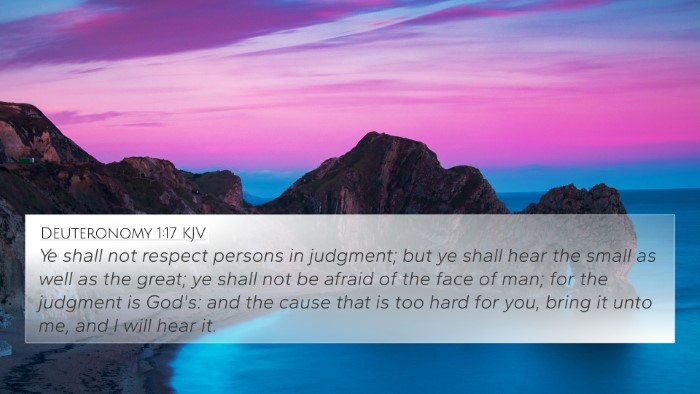Understanding 2 Chronicles 18:30
Bible Verse: 2 Chronicles 18:30 - "And the king of Israel said unto Jehoshaphat, I will disguise myself, and enter into the battle; but put thou on thy robes. So the king of Israel disguised himself, and they went into the battle."
Verse Summary
This verse captures a critical moment in the narrative where King Ahab of Israel deceives both his enemy and his ally, King Jehoshaphat of Judah, by disguising himself during a battle. The intention behind this act highlights themes of trust, deception, and the consequences of choosing worldly strategies over divine guidance.
Commentary Insights
Matthew Henry: Henry observes that Ahab's disguise demonstrates a lack of faith in God's protection. By attempting to manipulate the situation through deceit, he reveals a heart not fully committed to God. Ahab’s actions serve as a cautionary tale about the dangers of placing reliance on human cunning rather than divine providence.
Albert Barnes: Barnes highlights the significance of Jehoshaphat's role in this scenario. Despite being a righteous king, Jehoshaphat is drawn into Ahab's deceptive plan. This reflects the peril of aligning oneself with those who do not seek God, thus encouraging believers to be discerning in their associations and alliances.
Adam Clarke: Clarke emphasizes the psychological implications of Ahab's disguise, noting it as a manifestation of fear and cowardice. Clarke suggests this act ultimately leads to Ahab's downfall, illustrating how reliance on deception rather than faith can lead to tragic consequences in one’s life.
Key Themes and Lessons
- Deception and Trust: Ahab's choice to disguise himself indicates a lack of trust in God and the lengths one may go to in order to evade accountability.
- Importance of Righteous Alliances: Jehoshaphat’s involvement emphasizes the necessity of discerning associations with others, particularly regarding spiritual integrity.
- Consequences of Wrong Decisions: The actions taken in this moment lead to significant events in the lives of those involved and illustrate the overarching narrative of moral consequence in the Biblical text.
- The Nature of Warfare: There is a contrast between earthly strategies and God’s plan, reinforcing that God’s sovereignty reigns even in dire circumstances.
Bible Cross-References
- 1 Kings 22:30-34: The parallel scripture where Ahab’s disguise and the outcome of the battle are discussed in more detail.
- 2 Chronicles 19:2: Jehu’s rebuke of Jehoshaphat illustrates the consequences of aligning with the wicked.
- Proverbs 12:5: The contrast between the plans of the righteous and the wicked, underscoring the importance of integrity.
- Isaiah 31:1-3: A warning against putting trust in worldly alliances rather than God.
- Psalm 37:5: The call to commit one’s way to the Lord rather than relying on personal wisdom or strategies.
- James 1:5: A reminder that when lacking wisdom, one should ask from God who gives generously without reproach.
- Galatians 6:7: The principle of reaping what one sows, relevant to Ahab’s deceitful conduct.
Connecting Themes and Interpretations
In analyzing the themes and implications of 2 Chronicles 18:30, one finds numerous connections across the scripture that delve into the importance of faith, integrity, and the consequences of choices. By engaging in Bible verse cross-references, believers can draw from a deeper understanding of the text and its applications in their spiritual lives.
Furthermore, utilizing tools for Bible cross-referencing can enhance one's study, offering insights that illuminate the interconnectedness of Biblical teachings. Various Bible reference resources are available for those interested in a more thorough exploration of scriptural themes and their implications in the lives of believers today.
Conclusion
2 Chronicles 18:30 serves as a poignant reminder of the dangers that arise from straying from trust in God and the implications of our decisions on our spiritual journey. As we seek to understand the Bible verses that relate to each other, let us remain mindful of the lessons woven throughout scripture and the unified message they articulate about faith, integrity, and divine guidance.







